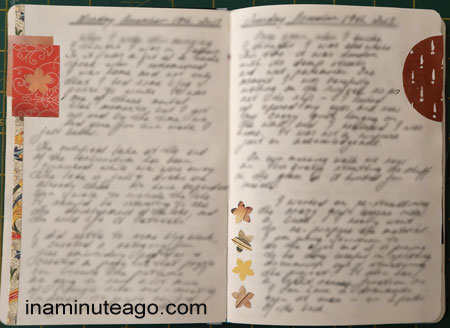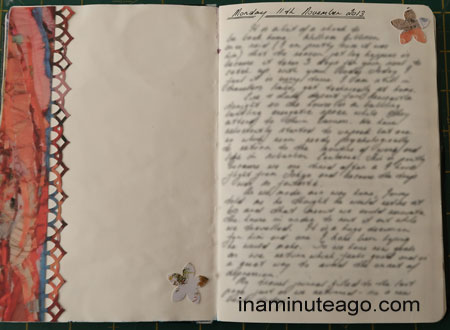 How to keep a journal
How to keep a journal
Just about every self-development book and blog tells people to keep a journal, but not necessarily how to keep a journal. I’ll let you in on a secret – it is not particularly difficult to do and there are no rules to keeping a journal. You can write, draw, glue-in ephemera, take photos and paste printouts in your journal whatever you enjoy, is OK. If I had to think of ‘rules’, I would recommend you date the page and add your entries chronologically. However, I am sure somewhere in the world, there is someone journaling who is breaking these two ‘rules’ so, perhaps that makes them guidelines only!
You will get out of your journal what you put in. The more engagement with the process and focus, the more you are likely to enjoy and get something out of journaling. So here are my tips on how to keep a journal and perhaps it might help you keep up a good habit.
Choose a format that suits your lifestyle
Choose a format that suits your life and that you think will be fun. You may delight in the feel of a fountain pen gliding over silky-smooth paper. You may want to sketch and write. Or use spelling checkers, grammar correction and search functions may be your thing. So your choice may be to write your journal using a computer or tablet. You may like the idea of an app on your tablet or phone. Whatever fits with your lifestyle and suits your personality is the right choice for you.
Have realistic expectations and keep it simple
My next tip on how to keep a journal is to keep it simple. You do not have to overcomplicate the process. All you need is to open the first page, or open a file, write or type the date at the top and start writing about your day. It sounds simple but for many people, they stall either after a few days or a week or a month. Sometimes, this is because when they start a journal they have expectations that they will be able to write beautifully phrased, technically polished, meaningful daily entries in their journal.
Sorry, journaling is like that. With the exception of 2 breaks of 6 weeks, I have written a journal daily since 1989. My daily companion has been my journal. During that time I have written some entries of substance on occasion. To be honest, much of my journal is the day-to-day stuff. To my delight, the day-to-day stuff can become significant in time. The things I am stitching, the drawings I make, the books I read, the movies I see, the garden I tend, the designs I am working on, or the website I write, become interesting over time as they become part of a greater pattern. The pattern that forms is not just the pattern of my single life but also a description of the culture in which I live, and the times I live through.
Don’t worry about a word count
Entry length is not important and there will be some days where motivation is low, so don’t worry, feel guilty, or beat yourself up. Simply write a basic entry. There will be other days to record and be energised about.
Don’t worry about not being interesting enough
At one stage, I felt that I had to live a larger, more interesting life to keep a journal. I felt my humdrum existence was not worth writing about. However, when I read George Orwell’s Diaries (online here if you would like to read them) I realised that even those whom we think of as having important, full and interesting lives, record the domestic. George Orwell recorded many things in his life, many entries are the sort we would expect from a famous author. His diaries are about writing, political events, and about the books he has read and people he met. But he also kept a vegetable garden so he records when he plants out, parsnips, carrots, lettuce and the like. George Orwell also recorded the number of eggs his chickens lay. When I read the daily egg count I smiled as it illustrated to me that writing about the domestic and the everyday in a journal is OK. So my advice on how to keep a journal is to keep it simple, record your life – after all, it’s what you have got, so work with that!
Sort out why you are keeping a journal
Everyone has a slightly different reason for being attracted to journaling. You need to know why, as this can give you a hint as to the direction your journal may take. It will help you when you face that blank page and wonder what on earth you are going to write about. For instance, you may want to track your fitness and record the exercise you do and the food you eat. Or what about the books you read or the music you listen to. Or you may want to track an interest, such as quilting or stitching and record what you do and capture ideas for projects or may set a creative goal such as learning to draw or write creatively. All these things and many others can be the main focus of a journal or you can include the lot!
In my own journals, I track quite a range of different activities. For instance, I record my morning walks, distance etc, so it is a record of that activity. But I also record the birds and animals I see. I started doing this after the Canberra fires, as so many animals disappeared. But as the forest has re-established, the animals returned and now I can see over the past 13 years what the pattern has been. I track my stitching projects in a studio journal but I often mention them in my daily journal. In my studio journal, I record the nitty-gritty stuff like what thread was used or what stitch. In my journal, I track the general progress of the project. I also sketch in my journal as I want to improve my drawing skills. These sketches are not of great importance other than keeping my hand in and providing a place to practice. You can use your journal to record anything you regularly do.
 Observational journaling
Observational journaling
Learn to look outwards. I have encountered people describing attempts to keep a journal, but have given up because they got “tired of ranting and writing over-emotional stuff”. You do not have to delve deeply into your emotional life. I think in the teen years, many people keep a journal and because the teens are about growing into adulthood, many journals are angst-ridden documents best forgotten. A journal is more than something kept by teens. How to keep a journal as an adult is more about recording observational content. Sure, everyone has the odd rant in their journal, but not all the time – it can get boring! Look outside your emotional life, what have you been doing? What did you see today? Use your journal to record other aspects of who you are such as what you observe and think. Everyone has feelings, but that is not the only topic you can write about! Think in terms of observational journaling, recording what you see, do, and think about the world you live in rather than just the body you live in.
Write for yourself, not for others
Record what you have been doing in the past 24 hours. Think about your key interests, the people you have met, books read, movies watched, podcasts listened to. Or write about changes in your life. They can be small and apparently insignificant, such as changes in the local landscape, road works or street trees being pruned. What amazes me is there is always something changing. Look at the larger picture too and describe your living situation, work, and relationships or what is happening on the News. World events do affect our life so record them. List the people/things in your life that you appreciate and take note of what you are grateful for.
Timing can be everything
Some people find it useful to set aside a particular time of the day and write their journal. Long stretches of my life were of such regularity that I could set aside a block of time each day. Other phases of my life, I write when I have some time – morning noon or night it does not matter as long as I do write. Everyone is different and choosing what is right for you will help you maintain a journaling habit.
Journaling does not have to be done in one session. People often assume that you write a journal entry in one sitting. It is nice if you can as it keeps entries consistent but there are no right or wrong ways to write a journal. There are no rules you can keep a journal your way that also means when and where you write it. You can write for 15 minutes in your lunch hour and another 15 minutes in the evening or you use pockets of time in your day to write a few observations down. Often breaking up the writing into smaller chunks throughout the day means you observe more.
Add visual interest
Don’t forget in contemporary journals you can do more than write. If you are happy just writing, that is fine – no rules, remember – but you can combine visual elements such as sketching, collage, painting, printmaking, and photography. You can play with book formats and have fold-out pages, concertina pages and pull outs. Adding ephemera collected during your day is fun and speaks of the times. Adding visual interest to your pages is a huge topic and one I will expand upon with more than one post, no doubt. My point here is that contemporary journaling is not just about writing a journal, it has become very much about creating a journal.
Those are my key tips on how to keep a journal. I hope you have found them useful. Do you have any other tips? Let me know in the comments below.
You may enjoy these article too!
Why Keep a Journal
Some ideas on how to journal
How to Choose a Journal
Have Inaminuteago delivered to your inbox by using the ‘follow’ feature in the sidebar. If you are on a mobile or tablet you will need to scroll to the bottom to find the ‘follow’ feature. Just enter your email address, and when you get the confirmation email make sure you say yes and you are all set!

Thank you for such a thoughtful listing, it really helped me.
Kathy thanks I am pleased you found it useful
Very interesting, Sharon. I am keeping several journals. I kept special ones when we were travelling. Searching a house in France was a reason to write down date and places and sketches of the houses we visited. It is a perfect reference. I am not good in sketching, but I can recognize every house again. Little drawings make it easy to find events again. I keep concert programs in it and entry tickets to theater performances…. and so on…and so on. I can‘t imagine life without a journal.
Hi Anneliese I can’t imagine life without a journal either!